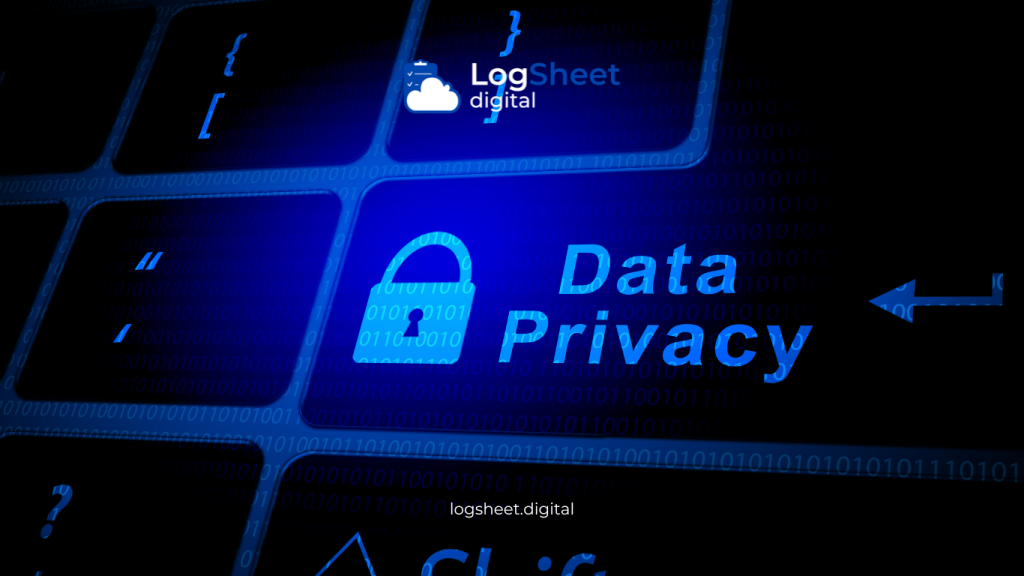Digitalization has transformed many aspects of operations in various sectors, including the automotive industry and workshops. One technology that is increasingly being adopted is the digital logsheet. This technology simplifies data entry, vehicle management, and other operational activities. However, behind this convenience, there is a significant challenge related to data security.
Workshops using digital logsheets face risks such as data theft, cyberattacks, and system vulnerabilities. This article delves deeply into the security challenges faced by workshops and strategies to optimally protect digital logsheet data.
1. Importance of Data Security in Digital Logsheets

Read More: Data Security in Digital Logsheets: Challenges and Security Strategies
Digital logsheets not only replace manual systems but also become a rich and sensitive source of data. The data typically recorded includes:
- Customer information, such as name, phone number, and address.
- Vehicle details, including license plate number and service history.
- Inventory data of available spare parts.
- Financial transaction records, including payments and invoices.
If this data is misused, the implications are significant: loss of customer trust, financial loss, and even legal violations. Therefore, ensuring the security of digital logsheets is a strategic step in maintaining the integrity of workshop operations.
2. Types of Data Vulnerable in Workshop Digital Logsheets

Read More: Implementing Digital Logsheets in Safety Inspections
a. Customer Data
Customer data is a primary target for theft because it is valuable for fraud, phishing, or even illegal data sales.
b. Operational Data
Operational data, such as spare part stock or vehicle maintenance schedules, can be manipulated for the benefit of irresponsible parties.
c. Financial Data
Unprotected financial transaction data is at risk of being stolen, which could lead to business information leakage or even direct losses.
3. Data Security Challenges in Digital Logsheets

Read More: Overcoming Digital Logsheets Implementation Challenges in Logistics Environments
a. Cyberattack Threats
Hackers are becoming more sophisticated in launching attacks such as:
- Phishing: Deceiving employees into providing system access to logsheets.
- Malware: Infiltrating malicious software to steal or damage data.
- Ransomware: Locking important data and demanding a ransom for access.
b. Technology Infrastructure Vulnerabilities
Systems that are not updated regularly are at risk of security gaps. For example, outdated software is more susceptible to attacks.
c. Human Error in Data Management
Human errors are one of the main causes of security breaches. Examples include weak password usage, accessing data through insecure devices, or clicking on harmful links.
d. Inadequate Data Security Regulations
In some regions, regulations regarding data protection are not strict enough, increasing the risk of violations.
4. Data Security Strategies for Digital Logsheets in Workshops

Read More: Digital Logsheets and Sustainability: Optimizing Calibration Equipment Use
To overcome these challenges, here are strategic steps that can be implemented:
a. Authentication and Access Control Systems
To enhance security, it is essential to use two-factor authentication (2FA) and role-based access control. By implementing 2FA, workshops can add an extra layer of protection, ensuring that only authorized individuals can access sensitive data. Furthermore, role-based access control helps limit who can view or edit data, thereby minimizing the risk of unauthorized changes. Together, these measures provide a stronger defense against potential breaches and ensure that only the right people have access to critical information.
b. Data Encryption Implementation
All data, both stored and transmitted, should be encrypted using protocols such as SSL/TLS. This ensures that the data cannot be accessed by third parties even if a breach occurs.
c. Cybersecurity Training for Employees
Employees are on the front line of data security. Training on cyber threats such as phishing, malware, and the importance of maintaining password confidentiality is essential.
d. Regular Security Audits
Conduct regular security audits to identify gaps or vulnerabilities in the system. These audits also help ensure compliance with the latest security standards.
e. Layered Data Backup Systems
Store backup data in separate locations, such as the cloud and local hardware. Backups should be automated and scheduled regularly.
f. Using Reliable Digital Solution Providers
Choose a digital logsheet provider with a good reputation and advanced security features, such as automatic threat detection and technical support.
5. Benefits of a Strong Data Security System

Read More: Optimizing Asset Maintenance through Digital Logsheets
Investing time and resources in data security provides several benefits:
- Protection Against Threats: Reduces the risk of cyberattacks and data loss.
- Customer Trust: Customers feel secure knowing their data is protected.
- Regulatory Compliance: Meets legal requirements related to data protection.
- Operational Efficiency: Secure systems tend to be more reliable and less prone to disruptions.
6. Case Study: Lessons from Digital Logsheets Security in Modern Workshops

Read More: Digital Logsheets in Improving Workshop Performance and Cost Reduction
For example, a large workshop in Jakarta implemented a layered security strategy for their digital logsheets system. By integrating encryption, two-factor authentication, and employee training, they successfully prevented a ransomware attack that could have caused hundreds of millions in losses.
These measures also improved operational efficiency, as employees could work without technical disruptions.
7. Conclusion and Recommendations

Read More: Planning Efficient Production
Data security is the foundation of successful digital logsheet use in workshops. Given the continuously evolving nature of cyber threats, it is crucial for workshops to adopt a comprehensive security strategy. This strategy should include layered authentication, robust data encryption, and ongoing employee training. By implementing these measures, workshops can effectively safeguard their data against potential breaches and ensure the integrity of their digital systems.
By implementing these measures, workshops can maintain data integrity, protect customer trust, and ensure business continuity. Data security is not just a necessity, but a long-term investment for business growth.






leave your comments